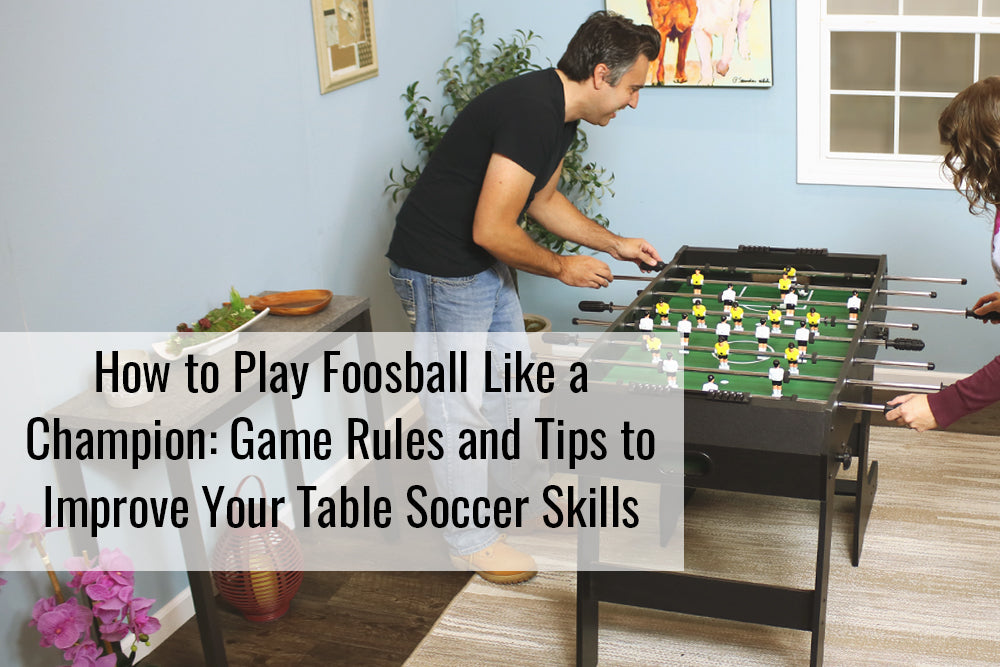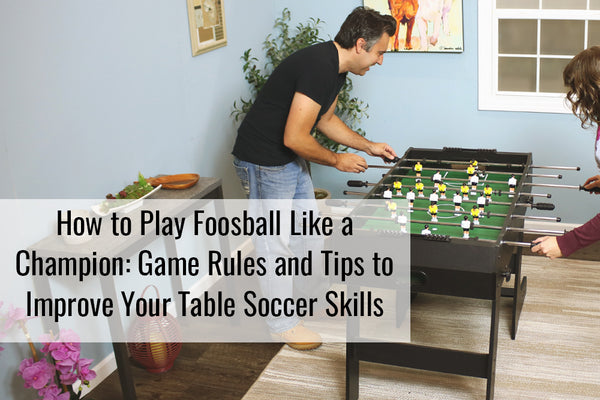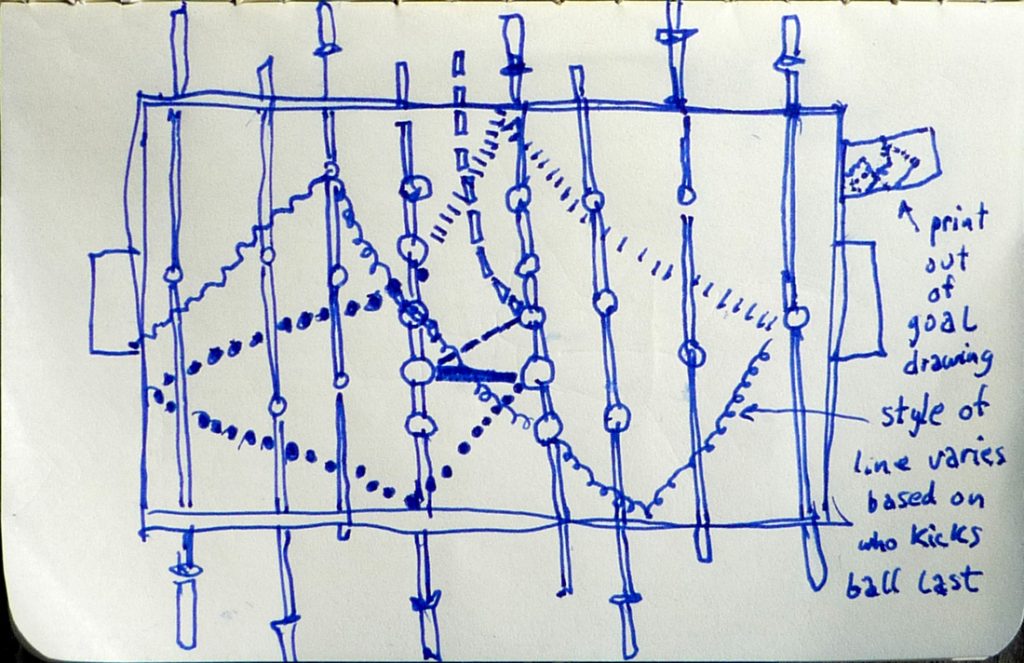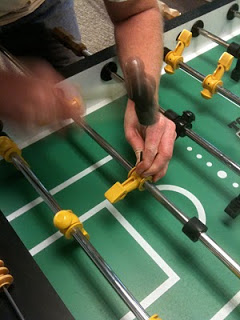Want to improve your foosball skills? You’re in the right place.
Foosball is a fun, fast-paced game that anyone can enjoy. Whether you play casually with friends or aim to compete, getting better at foosball is rewarding. It’s not just about spinning rods; strategy and skill play a big role. In this blog, we’ll explore tips to enhance your foosball abilities.
From mastering the basics to understanding advanced tactics, there’s always room to grow. Ready to up your foosball game? Let’s dive in and turn you into a formidable opponent at the table.

Credit: sunnydazedecor.com
Introduction To Foosball
Foosball is a fun and exciting game. It is played worldwide. Whether you’re a beginner or a seasoned player, improving your foosball skills can be highly rewarding. This guide will help you understand the basics and give you tips to become better at foosball.
Brief History
Foosball, also known as table soccer, has a rich history. It originated in Europe in the late 19th century. The game was designed to mimic soccer. It gained popularity quickly and spread across the world.
By the mid-20th century, foosball tables were common in bars and game rooms. Today, foosball is played both recreationally and competitively. Major tournaments are held globally, drawing in many enthusiasts.
Basic Rules
The basic rules of foosball are simple and easy to learn. Here are some key points:
- Each team has four rows of players on rods.
- The objective is to score by getting the ball into the opponent’s goal.
- You can spin the rods to hit the ball, but excessive spinning is typically against the rules.
- Games are usually played to 5 or 10 points, depending on the agreement.
- Players must serve the ball from the center hole to start the game.
Understanding these rules is crucial for playing and enjoying foosball. Start practicing and you’ll get better with time.

Credit: sunnydazedecor.com
Choosing The Right Equipment
Choosing the right equipment can make a significant difference in your foosball performance. From the quality of the table to the type of foosball balls and handles, each component plays a crucial role. Understanding what to look for can help you play better and enjoy the game more.
Table Quality
Investing in a high-quality foosball table is essential. Look for a sturdy table with a solid build. A stable table prevents unwanted movement during play. High-quality tables often have adjustable legs. This feature helps keep the table level on uneven surfaces. Another factor is the surface material. Opt for a smooth and durable playfield. This ensures the ball moves consistently. Avoid tables with rough or uneven surfaces. They can affect your gameplay negatively.
Foosball Balls
The type of foosball balls you use matters. Choose balls that are smooth and round. The weight of the ball can also impact your game. Lighter balls are easier to control. They move quickly across the table. Heavier balls, on the other hand, offer more precision. Experiment with different balls to find what suits you best. Some prefer textured balls for better grip. Others like glossy balls for faster play. The right ball can improve your overall performance.
Handles And Grips
Handles and grips are often overlooked but are very important. Comfortable handles can reduce hand fatigue. Look for handles with a good grip. Rubber or silicone grips are popular choices. They provide a firm hold and prevent slipping. Consider adding grip wraps to your handles. They offer extra comfort and control. Good grips allow for better ball control. This can make your shots more accurate. Pay attention to the thickness of the handles. Thicker handles may be more comfortable for larger hands.
Mastering Basic Skills
Foosball is a fun and exciting game. Many people play it socially or competitively. To improve, you need to master basic skills. These skills include grip and stance, passing techniques, and shooting basics. Learning these will help you play better and win more games.
Grip And Stance
Grip the handle lightly. This allows for better control. A tight grip makes quick movements harder. Stand with your feet shoulder-width apart. Bend your knees slightly. This stance gives you better stability. Keep your body relaxed. Avoid leaning too much forward or backward.
Passing Techniques
Good passing is key in foosball. Use your wrist to flick the rod. This helps you pass the ball quickly. Aim for the feet of your players. Practice short and long passes. Mix them up to confuse your opponent. Always look for open players. Passing to the right player can lead to a goal.
Shooting Basics
Shooting is crucial in foosball. Practice different types of shots. Push and pull shots are common. Use your wrist for power. Aim for the corners of the goal. This makes it harder for the goalie to block. Remember to practice shots from different angles. This will make you a versatile player.
Advanced Techniques
Advanced techniques in foosball can elevate your game. They require practice and precision. Let’s explore some key advanced moves to improve your skills.
Pin Shots
Pin shots are powerful and accurate. To execute a pin shot, trap the ball under a rod. Then, flick the rod forward or sideways. This motion propels the ball toward the goal. Practice control to ensure precision. Pin shots can surprise your opponent.
Aerial Shots
Aerial shots involve lifting the ball off the table. This technique adds flair and unpredictability. Begin by flicking the ball upward with a rod. Aim and strike the airborne ball into the goal. Timing and coordination are crucial. Aerial shots can be game-changers in tight matches.
Bank Shots
Bank shots use the table walls for redirection. Aim the ball at the wall to bounce it into the goal. This move can outsmart defenders. Calculate angles carefully for accuracy. Bank shots offer a creative way to score. They add variety to your offensive strategy.
Defensive Strategies
Foosball requires more than just quick reflexes. Defensive strategies can make a huge difference. Improving your defense can help you win more matches. Let’s dive into some key defensive strategies.
Goalie Tips
Your goalie is your last line of defense. Keep the goalie centered to cover more area. Avoid moving the goalie too much. Small movements can block most shots. Focus on positioning. Place the goalie slightly off-center. This confuses the opponent. They might shoot where the goalie can easily block.
Blocking Techniques
Blocking is an essential part of defense. Use your rods to block shots. Keep your players close together. This reduces gaps. Move players in sync with the ball. Anticipate the opponent’s moves. Practice makes perfect. The more you practice, the better your blocking will get.
Reading Opponents
Watch your opponent’s playing style. Do they favor certain shots? Do they have a pattern? Observing these details helps. Adjust your defense based on their habits. If they shoot straight, block straight. If they like angles, position your players accordingly. Being aware gives you an edge.
Offensive Strategies
Want to improve your foosball skills? Mastering offensive strategies is key. Learn to set up plays, execute quick shots, and use mind games. Below are some essential tactics to dominate your game.
Setting Up Plays
Setting up plays is crucial. It gives you control and keeps the defense guessing. Here are some tips:
- Always keep your players in motion.
- Pass the ball quickly and accurately.
- Use wall passes to evade defenders.
- Position your players to receive passes.
Practice these techniques. They help you keep the ball. They also make it easier to score.
Quick Shots
Quick shots are essential for scoring. They catch the opponent off guard. Here are some steps:
- Keep your wrist loose.
- Focus on snap shots and pull shots.
- Aim for the corners of the goal.
- Practice shooting without looking at the ball.
Quick shots are about speed and accuracy. They increase your chances of scoring.
Mind Games
Mind games are about psychology. They make your opponent second-guess. Consider these strategies:
- Fake a shot to mislead the opponent.
- Vary your speed and shot angles.
- Use hesitation moves to confuse the defense.
- Watch your opponent’s habits and adapt.
Mind games add an extra layer of strategy. They can make a big difference in tight matches.
Incorporate these offensive strategies into your practice sessions. They will help you become a better player. Good luck!
Training And Practice
To be better at foosball, consistent training and practice are key. Improving skills takes time and effort. Focusing on drills, consistency, and analysis will help you become a better player. Each aspect of training builds on the other. Let’s dive into how you can improve your foosball game through structured practice.
Drills For Improvement
Drills are essential for skill development. Start with basic passing drills. Practice passing the ball between your players on the same rod. Move to more advanced drills. Focus on shooting and blocking. Try the tic-tac drill. Pass the ball quickly between players. This builds control and speed.
Another useful drill is the five-bar passing drill. Practice passing the ball from the five-bar to the three-bar. This improves your midfield control. Regular drills help you build muscle memory. Over time, you will see improvement in your gameplay.
Consistency And Repetition
Consistency is crucial in foosball. Set aside regular practice times. Practice the same drills repeatedly. Repetition helps in mastering skills. The more you practice, the more natural your movements become. Consistent practice also helps in identifying weak points.
Track your progress. Keep a practice journal. Note down areas that need improvement. Focus on those areas in your next practice session. Consistency and repetition are your best friends in foosball.
Analyzing Your Game
Analyzing your game is vital for improvement. Record your matches. Watch them later to spot mistakes. Look for patterns in your play. Identify areas where you lose the ball often. This can help you understand your weaknesses.
Seek feedback from other players. They might spot things you miss. Use their insights to improve. Analyzing your game helps you become a smarter player. It allows you to make strategic adjustments. Constant analysis leads to continuous improvement.
Mental Preparation
Mental preparation is a crucial aspect of improving your foosball skills. A focused mind can make all the difference in a fast-paced game. This section will guide you through effective mental strategies to help you stay focused, handle pressure, and build confidence.
Staying Focused
Maintaining focus during a foosball game is essential. Here are some tips:
- Limit distractions. Play in a quiet, comfortable environment.
- Set clear goals. Know what you want to achieve in each game.
- Practice mindfulness. Take deep breaths to stay calm and alert.
These strategies will help you keep your head in the game and make better decisions.
Handling Pressure
Pressure can affect your performance. Learn to manage it:
- Stay positive. Focus on your strengths and past successes.
- Break it down. Think of the game in smaller, manageable parts.
- Visualize success. Picture yourself making the winning shot.
Effective pressure management will help you stay composed and perform well under stress.
Building Confidence
Confidence is key in foosball. Build it with these tips:
- Practice regularly. The more you play, the better you get.
- Learn from mistakes. Use them as stepping stones to improve.
- Celebrate small wins. Acknowledge every bit of progress you make.
Confident players make decisive moves and handle challenges better.
Playing In Tournaments
Playing in foosball tournaments can be thrilling and challenging. They offer a chance to test your skills against other players. Tournaments also provide a great opportunity to learn and grow. To perform well, preparation and etiquette are crucial. It’s important to approach these competitions with the right mindset and strategies.
Preparation Tips
Preparation is key to success in foosball tournaments. Practice regularly to improve your control and shots. Focus on both offense and defense. Study different playing styles to understand common strategies. Warm up before matches to get your reflexes ready. Ensure you have the right equipment, including a good grip on your handles.
Tournament Etiquette
Good etiquette helps maintain a positive atmosphere. Always respect your opponents, win or lose. Shake hands before and after each match. Follow the tournament rules closely. Avoid unnecessary distractions and stay focused. Being polite and considerate will earn you respect from other players.
Learning From Competitions
Each tournament is a learning experience. Analyze your matches to identify strengths and weaknesses. Watch other players and learn from their techniques. Take notes on what works and what doesn’t. Use these insights to improve your game. Remember, every loss is a step towards becoming a better player.

Credit: www.youtube.com
Frequently Asked Questions
How Can I Improve My Foosball Skills?
To improve your foosball skills, practice consistently and focus on mastering basic techniques. Watch tutorials and play against skilled opponents to learn new strategies.
What Are Common Foosball Strategies?
Common foosball strategies include ball control, passing, and setting up shots. Focus on maintaining possession and executing quick, accurate passes.
How Do I Improve Ball Control In Foosball?
Improving ball control requires practicing dribbling techniques and developing a soft touch. Use your wrists to control the rods for better precision.
What Is The Best Grip For Foosball?
The best grip for foosball is a firm yet relaxed hold. Use a wrist flick to generate power and maintain control.
Conclusion
Improving at foosball takes practice and focus. Remember to keep your wrist relaxed. Learn to control the ball with precision. Always stay alert and anticipate your opponent’s moves. Try different strategies to see what works best. Play with friends to enhance your skills.
Watch tutorials for new techniques. Stay patient and persistent. Enjoy the game and have fun while playing. With time and effort, you’ll see progress. Keep practicing and stay motivated.


